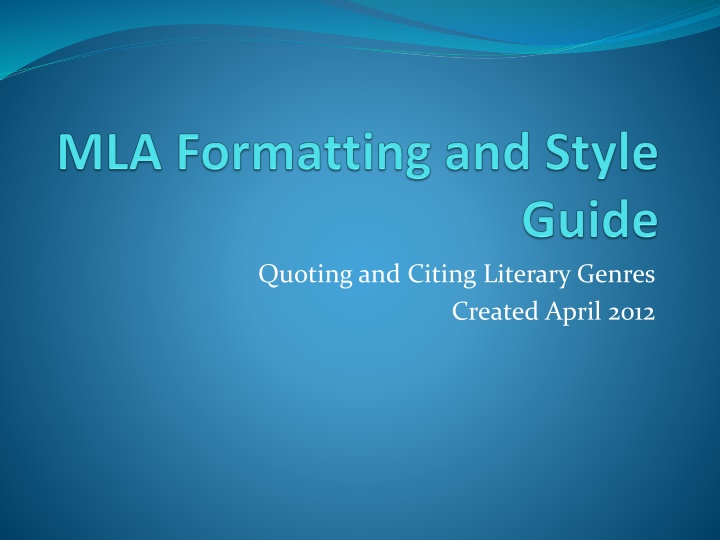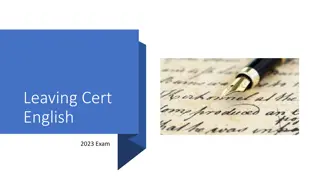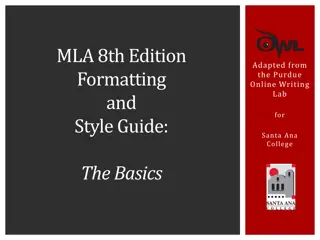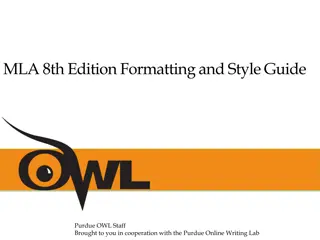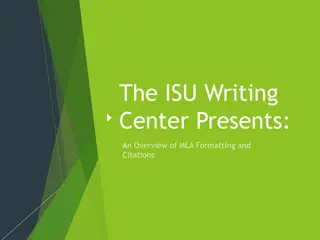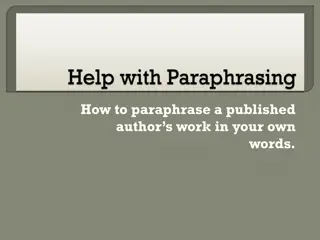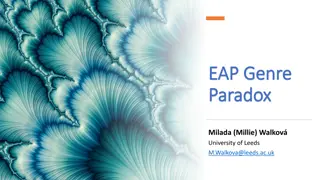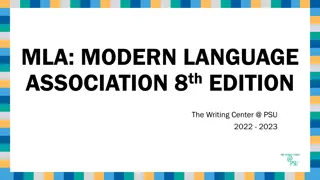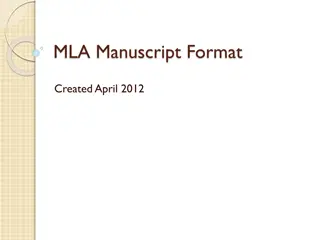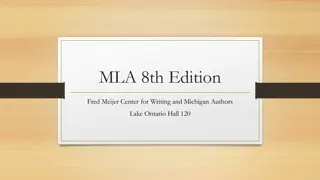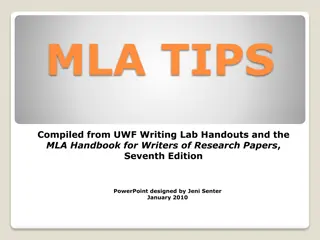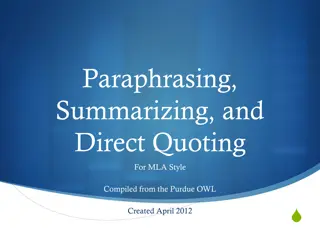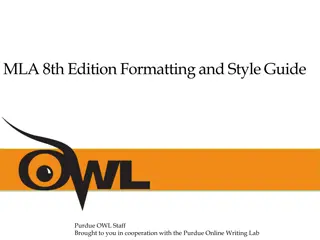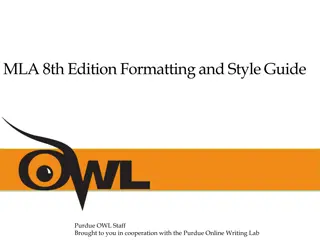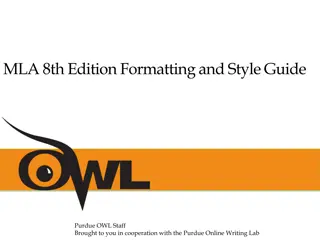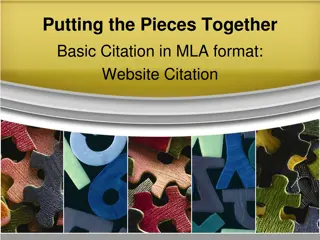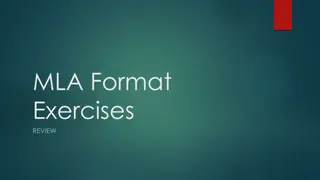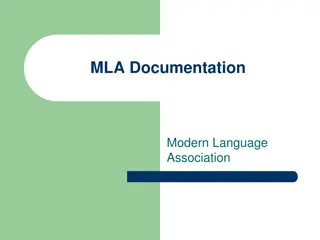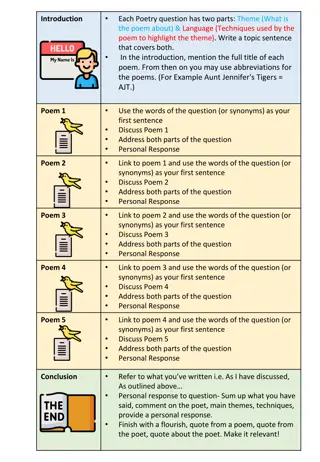Modern Language Association (MLA) Guidelines for Quoting and Citing Literary Genres
Learn how to properly quote and cite literary genres following the MLA Handbook for Writers of Research Papers. Explore guidelines for citing authors in parenthetical citations and incorporating prose quotations into your text, including handling question marks and block quotes.
Download Presentation

Please find below an Image/Link to download the presentation.
The content on the website is provided AS IS for your information and personal use only. It may not be sold, licensed, or shared on other websites without obtaining consent from the author.If you encounter any issues during the download, it is possible that the publisher has removed the file from their server.
You are allowed to download the files provided on this website for personal or commercial use, subject to the condition that they are used lawfully. All files are the property of their respective owners.
The content on the website is provided AS IS for your information and personal use only. It may not be sold, licensed, or shared on other websites without obtaining consent from the author.
E N D
Presentation Transcript
Quoting and Citing Literary Genres Created April 2012
Information came from MLA Handbook for Writers of Research Papers
MLA Style In MLA documentation style, place the author s name in the parenthetical citation if the author is not mentioned in the sentence. The aesthetic and ideological orientation of jazz underwent considerable scrutiny in the late 1950s and early 1960s (Anderson 7).
MLA Style If the author is mentioned in the sentence, do not include the author s name in the parenthetical citation. According to Anderson, the aesthetic and ideological orientation of jazz underwent considerable scrutiny in the late 1950s and early 1960s (7).
Quoting Prose with Question Marks Place a question mark inside a closing quotation mark if a question mark occurs there in the quoted passage. Peetaasks, Where is Haymitch, anyway? Isn t he supposed to protect us from this sort of thing? If the quotation ends a sentence that is a question, place a question mark outside the quotation. Will Katniss turn into an Avox and wait on future tributes of Panem ? If a question mark occurs where a comma or period would normally be required, omit the comma or period. And what did they say? says Cinnacarefully.
Quoting Prose If a prose quotation runs no more than four lines and requires no special emphasis, put it in quotation marks and incorporate it into the text. Hashim and his wife had successfully sought to inculcate the virtues of thrift, plain dealing and a healthy independence of spirit (Rushdie 2856). The glassy contentment of Hashim s household is destroyed beyond all hope of repair (Rushdie 2856).
Block Quote If a quotation extends to more than four lines, set it off from your text by beginning a new line, indenting one inch from the left margin, and typing it double-spaced, without adding quotation marks. The Magistrate in J.M. Coetzee s Waiting for the Barbarians complicates the notion of justice as he translates the natives wooden slips: See, there is only a single character. It is the barbarian character war, but it has other senses too. It can stand for vengeance, and, if you turn it upside down like this, it can be made to read justice. There is no knowing which sense is intended. That is part of barbarian cunning. (112)
Block Quote If you quote two or more paragraphs, indent the first line of each paragraph an additional quarter inch. If the first sentence quoted does not begin a paragraph in the source, however, do not indent it the additional amount. Margaret Atwood artfully weaves dialogue and striking details throughout her short story, Hairball : Is this abnormal? Kat asked the doctor, who smiled. Now that he had gone in and come out again, unscathed, he was less clenched. Abnormal? No, he said carefully, as if breaking the news to a mother about a freakish accident to her newborn. Let s just say it s fairly common. Kat was a little disappointed. She would have preferred uniqueness. (34)
Poetry If you quote a single line, put it in quotation marks within your text. Auden ironically ends his poem: Had anything been wrong, we should certainly have heard (30). If incorporating two or three lines, use a slash with a space on each side to separate them. Auden ironically ends his poem: Was he free? Was he happy? The question is absurd: / Had anything been wrong, we should certainly have heard (29-30).
Poetry Verse quotations of more than three lines should begin on a new line. Indent each line one inch from the left margin and double-space between lines, adding no quotation marks that do not appear in the original. Elizabeth Bishop s In the Waiting Rom is rich in evocative detail: It was winter. It got dark early. The waiting room was full of grown-up people, arctics and overcoats, lamps and magazines. (6-10)
Alterations of Sources You can provide supplementary information, but keep them to a minimum and make sure to distinguish them from the original text. A comment or an explanation that immediately follows the closing quotation mark appears in parentheses. Lincoln specifically advocated a government for the people (emphasis added). Shaw admitted, Nothing can extinguish my interest in Shakespear (sic).
Alterations of Sources A comment or an explanation that goes inside the quotation must appear within square brackets, not parentheses. Milton s Satan speaks of his study [pursuit] of revenge. He claimed he could provide hundreds of examples [of court decisions] to illustrate the historical tension between church and state.
Alterations of Sources If a pronoun in a quotation seems unclear, you may add an identification in square brackets. Okonkwo is forewarned by the elder Ezuedu: Do not bear a hand in his [Ikemefuna s] death (Achebe 40). Certainly, Achebe considers his novel Things Fall Apart to be an act of atonement with [his] past (193). In the first act he soliloquies, Why she would hang on him [Hamlet s father] / As if increase of appetite had grown / By what it fed on. . . .
Ellipsis Whenever you omit words from a quotation, the resulting passage your prose and the quotation integrated into it should be grammatically complete and correct. For an ellipsis within a sentence, use three periods with a space before each and a space after the last ( . . . ). In surveying various responses to plagues in the Middle Ages, Barbara W. Tuchman writes, Medical thinking . . . stressed air as the communicator of disease, ignoring sanitation or visible carriers (101-02).
Ellipsis When the ellipsis coincides with the end of your sentence, use three periods with a space before each following a sentence period that is, four periods, with no space before the first or after the last. While describing his experiences in Africa, Marlow explains, We were wanderers on prehistoric earth, on an earth that wore the aspect of an unknown planet. We could have fancied ourselves the first of men taking possession of an accursed inheritance, to be subdued at the cost of profound anguish and of excessive toil. . . .
Ellipsis If a parenthetical reference follows the ellipsis at the end of your sentence, however, use three periods with a space before each, and place the sentence period after the final parenthesis. While describing his experiences in Africa, Marlow explains, We were wanderers on prehistoric earth, on an earth that wore the aspect of an unknown planet. We could have fancied ourselves the first of men taking possession of an accursed inheritance, to be subdued at the cost of profound anguish and of excessive toil . . . (Conrad 31-32).
